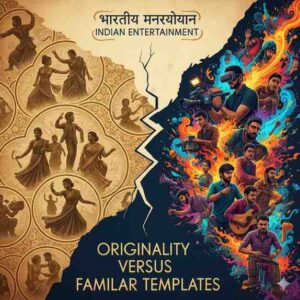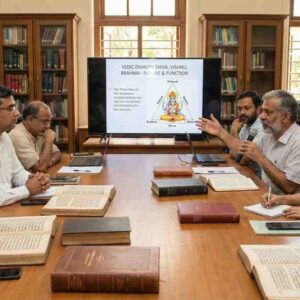Exploring the Foundations of Self and Society
Hindu philosophy, with its vast array of teachings and schools of thought, offers profound insights into how beliefs influence identity. At its core, it is not merely a religion but a way of understanding existence, purpose, and the interconnectedness of life. By examining concepts such asdharma(righteous duty),karma(action and its consequences), andatman(the soul), Hindu philosophy provides timeless frameworks for self-discovery and shaping societal roles.
This article delves into the key elements of Hindu thought that illuminate how beliefs sculpt individual and collective identities, guiding actions and shaping destinies.
1. The Self in Hindu Philosophy: UnderstandingAtman
- The Concept of Atman: Hindu philosophy emphasizes the atman, the eternal self or soul, as the essence of identity. Unlike the ego-driven self, the atman is universal, connecting all beings to a higher reality.
- Advaita Vedanta: The school of Advaita Vedanta, championed by Adi Shankaracharya, teaches that the atman is identical to brahman (ultimate reality), a non-dualistic view that sees individuality as an illusion. This belief shapes a person’s identity as interconnected with all life, fostering humility and unity.
- Practical Implication: Understanding the atman inspires introspection and mindfulness, encouraging individuals to look beyond material achievements and align their lives with spiritual growth.
2. Dharma: Identity Through Duty
- Role-Based Identity: Dharma represents the duties and responsibilities unique to one’s role in society—whether as a parent, student, leader, or friend. It shapes identity by aligning actions with moral and ethical values.
- Dynamic Adaptability: While rooted in ancient texts like the Bhagavad Gita and Manusmriti, dharma is adaptable, changing with time and context to meet societal needs.
- Educational Insight: Teaching dharma in modern schools, as done in the Indian Knowledge Systems initiative, connects students to their cultural heritage while fostering ethical thinking.
3. Karma: Actions Define Identity
- Karma’s Principle: Hindu philosophy teaches that identity is shaped not by birth but by actions. The law of karma—every action has a consequence—emphasizes accountability and continuous self-improvement.
- Moral Guidance: Karma encourages individuals to act selflessly, knowing that their deeds influence not only their current lives but also their future identities.
- Practical Relevance: This belief promotes personal responsibility and social harmony, reminding individuals that their actions impact the world around them.
4. The Four Purusharthas: Balancing Life’s Goals
- The Pillars of Life: Hindu philosophy outlines four purusharthas, or aims of life:
- Dharma: Righteous living.
- Artha: Wealth and prosperity.
- Kama: Pleasure and desires.
- Moksha: Liberation.
- Integrated Identity: These aims guide individuals to balance material pursuits with spiritual growth, shaping identities that are both grounded and transcendent.
- Contemporary Application: In modern life, balancing these aims fosters holistic well-being, encouraging people to pursue success without losing sight of ethical and spiritual goals.
5. The Role of Rituals in Shaping Identity
- Symbolic Practices: Rituals in Hinduism, from lighting a lamp to chanting mantras, reinforce beliefs and create a shared cultural identity.
- Community Bonds: Festivals and communal rituals, like Navratri or Diwali, strengthen social connections, fostering collective identities rooted in shared traditions.
- Modern Integration: Today, digital platforms allow rituals to evolve, helping younger generations stay connected to their cultural roots while adapting practices to modern lifestyles.
6. Advaita Vedanta and Liberation from Ego
- Non-Dual Identity: Advaita Vedanta challenges the ego-driven self, teaching that true identity lies in the realization of oneness with the universe.
- Liberation Through Knowledge: This philosophy encourages individuals to transcend egoistic desires and view themselves as part of a larger whole.
- Educational Value: Integrating these teachings into mindfulness and meditation programs enhances emotional intelligence and global awareness.
7. Community and the Collective Identity
- Vasudhaiva Kutumbakam: The concept of “the world is one family” reflects Hinduism’s emphasis on collective identity, inspiring inclusivity and compassion.
- Social Harmony: Hindu teachings on interconnectedness foster respect for diversity, promoting social cohesion in multicultural societies.
- Modern Practice: This principle is increasingly referenced in global dialogues, such as the 2023 World Interfaith Summit, emphasizing Hindu philosophy’s relevance in building unity.
Conclusion: A Philosophy That Shapes Lives
Hindu philosophy offers a profound understanding of how beliefs shape identity—both individual and collective. Through concepts likeatman,dharma, andkarma, it provides a guide to living with purpose, harmony, and interconnectedness.
As modern society seeks balance in an ever-changing world, these timeless teachings remind us to explore who we are, not only as individuals but as part of a greater whole. By embracing the wisdom of Hindu philosophy, we can build identities rooted in compassion, self-awareness, and the pursuit of truth.










